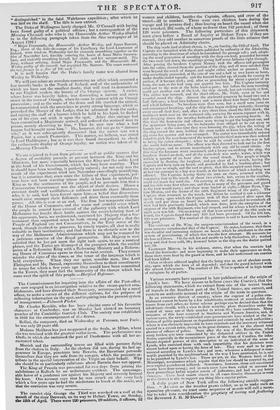--
Various accounts have appeared in late publications of the origin of Lynch's law, iVe have reason to believe (says the Courier), that the following statements, which we extract from one of the recent books of travels in the Southern part of the United States, are correct, and contain an authentic account of the origin of the term in question.
In an extensive district of country, where the expense of a police esta- blishment cannot be borne by a few inhabitants, scattered at considerable dis- tances from each other, no better scheme perhaps can be devised than that the inhabitants should, with a view to their security, place themselves under the contiol of sonic one of their lumber in whom they have confidence. Many instances of this have occurred in Southern and 'Western America, and, in various cases, the newly-established state governments have winked at the in- fliction of public punishment on depredators and criminals by such authorities ; where it was obviously impossible to have min-lin:11s and the necessary witnesses canned to a circuit town, owing to its great distance, and to the almost total absence of officers of police. Soon after the war of the Revolution, when many lawless acts were committed by the disbanded soldiers in the United States, especially in the mountainous parts of the State of Carolina, the inha- bitants deputed powers of this description to an individual of the name of Lynch, who exercised them with such impartiality that his decisions were almost looked upon as having the force of law. They were said to lie pro- nounced according to Lynch's law ; and now, whenever a delinqueut is sum- marily punished by the neighbourhood in the way I have mentioned, he is said to be-punished by Lynch's law. There are yet, on the Western bank of the Mississippi, occurrences which require that this law should be resorted to, and even capital panishment inflicted. Sometimes, however, these self-constituted courts have done wrong; and in such cases have been called to account for their proceedings before regular courts of judicature, and had to pay heavy damages. These local courts almost in all caws dissolve themselves as 50011 as the district is able to support any thing like a regular police.
A daily paper of New York offers the following amiable sugges-
tion. " As soon as the weather grows colder, so as to make such an operation pleasant, we trust some respecter of morals will call a meet- big to take into consideration the propriety of tarring and feathering the Reverend J. R. M‘Dowall."


























 Previous page
Previous page